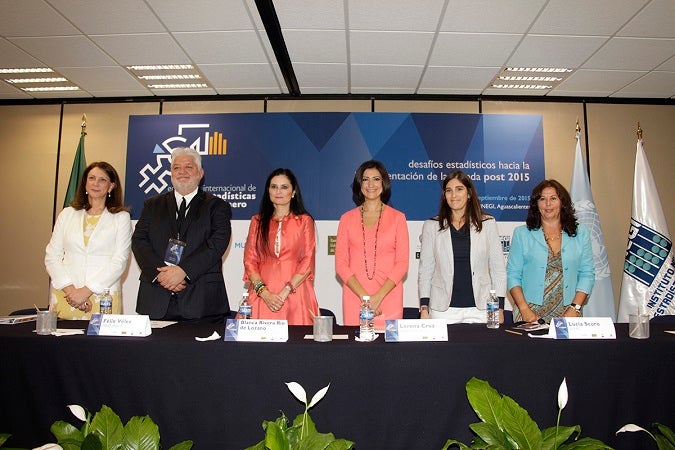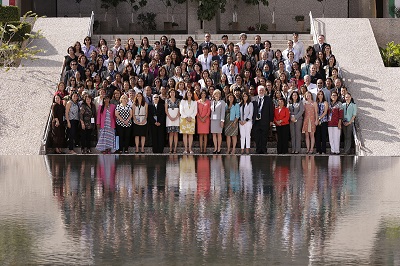XVI International Meeting on Gender Statistics in Aguascalientes
Date:

This Wednesday 9 September, the "XVI International Meeting on Gender Statistics" opens at the Headquarters of National Institute of Statistics and Geography (INEGI) in Aguascalientes to meet a range of important challenges. The goal of the Meeting is to revitalize efforts to achieve the advancement of women and gender equality, both of which were promoted by the Beijing Platform for Action and covered by the Millennium Development Goals (MDGs).
This Meeting also creates an opportunity to discuss options for strengthening the methodologies used in the production and use of statistical information and the development of gender indicators. This is to bring about substantial improvements for women and girls in such areas as poverty; productive, financial and technological assets; unpaid care work; statistics for violence against women and girls; and the participation of women in decision-making, among others.Félix Vélez Fernández, Vice-President of the Board of Governors of INEGI, was on hand to welcome the participants of this Meeting. He highlighted the fact that with regard to the development of statistical and geographic information, "INEGI has played a significant leadership role on the gender perspective through having such strategic partners as UN Women, ECLAC and INMUJERES, key institutions for the development of projects, indicators and information."
He also stressed that, "Mexico was the fourth country to measure Total Factor Productivity, disaggregating data by gender" plus it had more gender perspective products, such as the National Demographic Dynamics Survey (ENADID), the National Occupation and Employment Survey (ENOE) and the National Time Use Survey (ENUT) among others.
Lorena Cruz, President of the National Institute for Women (INMUJERES), said that, "this is a particularly important time as the 17 Sustainable Development Goals (SDGs) are about to be adopted and in 2016 agreement will be reached on the indicators and monitoring systems that will be used to follow up on progress."
The President of INMUJERES also stressed that, "the Meeting is an opportunity to hold discussions and make commitments to achieve an important mission: to secure gender equality, empower all women and girls and eradicate violence. She noted that the use of quantitative data from a gender perspective is crucial for the formulation of national plans and for properly monitoring them, and for rendering account and demanding accountability over the use and allocation of public resources.
Also at the opening ceremony, Luiza Carvalho, UN Women Regional Director for Latin America and the Caribbean, said that: "2015 is a historic, unprecedented opportunity to unite the countries and peoples of the whole world to make decisions and set out on new pathways to the future. UN Women is calling for us to work with rapidity and solidarity to support the transformative goals to turn a shared vision of a discrimination-free planet with equality for women, men, girls and boys into reality by 2030."
She also noted that, "we already have evidence today in the Latin America and Caribbean Region of how to incorporate the gender perspective in the production and analysis of statistical information What is most important, statistics are being used as a basis for public policies and budgets aimed at achieving real gender equality: the equality of results. We are the most innovative region for the production of statistics on time use, including its economic value and the beginning of care policies, in the incorporation of the multidimensional measurement of poverty - including time poverty - and for improving our record-keeping of violence against women."
She concluded by saying, "We know that this progress will be that much faster if statistics offices and mechanisms for the advancement of women succeed in establishing a continuous dialogue and join efforts to revolutionize the way in which information is produced and analysed, taking into account the growing demand for gender statistics."

Blanca Rivera Río de Lozano, President of DIF Aguascalientes, added that, "you cannot change what you do not know about, and to change the realities that denigrate the human dignity of women and every member of society, there is a need to cast light on all those situations that are limiting to the development of the Latin American nations."
It should be recalled that in 2000, Mexico took an important step to take this work forward and since then INEGI in Aguascalientes has become a space for reflection, analysis and debate between users and producers of gender-sensitive information.
The "XVI International Meeting on Gender Statistics: statistical challenges towards the implementation of the Post-2015 Agenda" is being held from 9 to 11 September 2015 and will be attended by nearly 200 participants including representatives from national statistics offices from Latin America and the Caribbean as well as international bodies and specialists in the field.
The proposals emerging from this forum will be used to seek implementation of public policies to eradicate gender inequality and discrimination against women and girls.